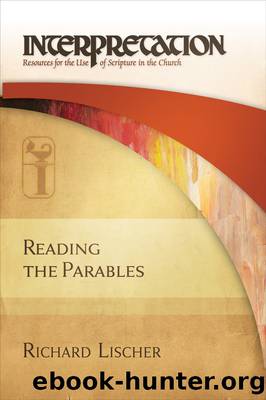Reading the Parables by Richard Lischer

Author:Richard Lischer
Language: eng
Format: epub
ISBN: 9781611645200
Publisher: Westminster John Knox Press
The Gospel of Luke
Earlier, I characterized Lukeâs parables as missional and literary. They are missional in the broadest sense of the word, depicting the thrust and contours of life in the kingdom of God. His parables are worldly, in the sense that they accurately reflect the ambiguities of the Christian life, to which Luke usually offers no pat resolution. He has virtually no allegories, which means he is less interested than Matthew in nailing down theological positions and more concerned that his readers identify with and experience the challenges of life in the kingdom of God. Luke favors what critics call the âexample story,â such as the parable of Lazarus and the Rich Man or the Good Samaritan; yet even in the most straightforward example story, a twist of uncertainty remains. On the whole, his longer stories contain a greater complexity of plot, psychological depth of conflict, and more descriptive detail than we are accustomed to in the Gospel of Matthew. Finally, his literary realism stands out against the formulaic language and cartoonish details of Matthewâs allegories. Lukeâs characters are recognizable to our culture, and their dilemmas confirm the modern readerâs experience. Their dreams, foibles, and complaints are familiar to us. Unlike Matthew, Luke manages to avoid clumsy or wooden introductions to the parables and integrates them more organically into the larger narrative of Jesusâ ministry. Of course, some critics contend that this is a weakness on Lukeâs part, since his framing of the parables occasionally betrays his own misunderstanding of the material he has received.
A good example of his organic style occurs at 14:7, where Luke introduces a thematic section on banqueting: âWhen he noticed how the guests chose the places of honor, he told them a parable.â Jesus observes human behavior at a fancy dinner, and it reminds him of a storyâthree stories, actually. The first two are example stories that reflect the values of the kingdom of God. The first, in 14:8â11, contains commonsense advice on seating arrangements at a dinner. If youâre not sure, itâs best to take the lowest place at the banquet, because a public upgrade is always better than a public humiliation. The second example story, in 14:12â14, is of a more radical nature, for it flies in the face of common sense and ordinary practice. He says, âWhen you give a luncheon or a dinner, do not invite your friends or your brothers or your relatives or rich neighbors [which nearly exhausts most peopleâs guest lists], in case they may invite you in return [which is everyoneâs social strategy].⦠But when you give a banquet, invite the poor, the crippled, the lame, and the blind [which never happens, but for which the communion table provides a practice run].â These are example stories and not âtrueâ parables, but such a judgment does not dull their theological value. They are not about hospitality or good manners or any other virtue separable from the radical new way of life in the kingdom of God. We
Download
This site does not store any files on its server. We only index and link to content provided by other sites. Please contact the content providers to delete copyright contents if any and email us, we'll remove relevant links or contents immediately.
| Children's Ministry | Counseling & Recovery |
| Discipleship | Evangelism |
| Missions & Missionary Work | Preaching |
| Sermons | Youth Ministry |
Fangirl by Rainbow Rowell(9251)
How to Bang a Billionaire by Alexis Hall(8156)
Wonder by R. J. Palacio(8110)
The Thirst by Nesbo Jo(6944)
The Space Between by Michelle L. Teichman(6941)
Assassin’s Fate by Robin Hobb(6218)
Wiseguy by Nicholas Pileggi(5786)
The Night Circus by Erin Morgenstern(5223)
Paper Towns by Green John(5191)
The Kite Runner by Khaled Hosseini(5180)
Bittersweet (True North #1) by Sarina Bowen(4845)
Gerald's Game by Stephen King(4654)
Too Much and Not the Mood by Durga Chew-Bose(4348)
Pillow Thoughts by Courtney Peppernell(4284)
Goodbye Paradise(3810)
Twelve Days of Christmas by Debbie Macomber(3567)
Good by S. Walden(3559)
The Rosie Effect by Graeme Simsion(3467)
The Cellar by Natasha Preston(3344)
